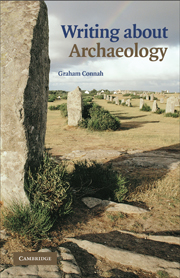Book contents
- Frontmatter
- Contents
- Figures
- Preface and Acknowledgements
- One Creating the canon
- Two Learning from others
- Three Readership determines form
- Four Turning data into text
- Five The process of writing
- Six Visual explanation
- Seven Pleasing everyone
- Eight Publishers, editors and referees
- Nine The publication process
- Ten The aftermath
- References
- Index
Eight - Publishers, editors and referees
Devils incarnate or guardian angels?
Published online by Cambridge University Press: 05 August 2012
- Frontmatter
- Contents
- Figures
- Preface and Acknowledgements
- One Creating the canon
- Two Learning from others
- Three Readership determines form
- Four Turning data into text
- Five The process of writing
- Six Visual explanation
- Seven Pleasing everyone
- Eight Publishers, editors and referees
- Nine The publication process
- Ten The aftermath
- References
- Index
Summary
When an archaeological author has completed a paper or a chapter or a book or some other piece of writing, she or he is apt to feel pleased or at least relieved. ‘At least that is over’, one is inclined to say to oneself. Nothing could be further from the truth! The real battle has only just begun. Even assuming that the tortures of repeated revisions are over (and that is very doubtful at this stage), there is still the matter of publication. I suspect that all of us start our writing careers somewhat naïve on this subject, and the process of learning can be stressful and there is no escaping its realities. Whether we like it or not, we can find ourselves having to satisfy the requirements of a publisher who is concerned about production costs and marketability, or an editor who wants to ‘correct’ our English or a referee who dislikes our ideas. I have known archaeologists who have been so incensed by such reactions to their writing that they have responded by throwing it in a drawer and sulking, in some cases for years rather than months. Instead, one needs either to seek another publication outlet or to grit one's teeth and negotiate the problems as far as possible; compromise can be a great healer. In particular, one must attempt to see the situation from the publisher's, editor's or referee's point of view (Derricourt 1996a, 1996b); one must seriously consider that they might actually be right! Might it be that they are not really trying to consign your work to the inferno but to raise it to celestial heights?
- Type
- Chapter
- Information
- Writing about Archaeology , pp. 158 - 171Publisher: Cambridge University PressPrint publication year: 2010



